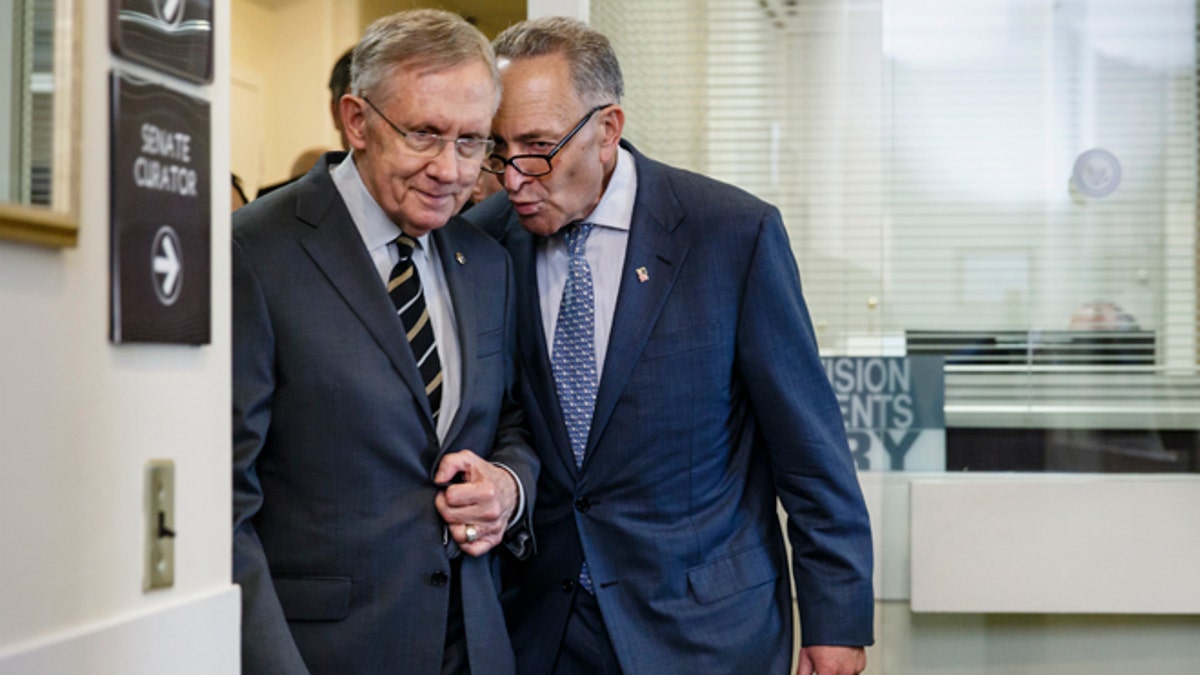
April 30, 2014: Sen. Charles Schumer, D-N.Y., the Democratic Policy Committee chairman, right, confers with Senate Majority Leader Harry Reid of Nev., on Capitol Hill in Washington, after a bill to raise the minimum wage was stopped in the Senate. (AP)
Cadillac. Tabasco. Kleenex. What do those three brands have in common? What do they have to do with why conservatives are losing their battle with the left?
Conservatives in general, and the GOP leadership in particular, fail to grasp the crucial ingredient of the Democrats’ success in shaping issues and putting conservatives on the defensive. This tactic is so insidious, it is one of the gravest threats to freedom and the conservative cause in decades.
Simply put, the left has hijacked language.
You might ask: How can a man living in a small northern California town claim to have insight into the contents of the left’s post-2008 secret sauce? Answer: Branding is what I do.
[pullquote]
I am also a multilingual American who understands that language is more than a means of transmitting information. It is also a lens through which we see and understand the world around us.
Many words have emotional impact and engender feelings beyond their dictionary definitions. The above brands -- Cadillac, Tabasco, Kleenex -- have taken on meanings that transcend the names of products.
Cadillac, for example, has become a synonym for “the best,” or “extravagant.” So much so that the word “Cadillac” has entered the health care debate as an adjective for a type of insurance plan that is the target of one of the taxes in ObamaCare. The phrase used is “a tax on Cadillac plans.” Not what the folks at GM had in mind, I am sure, but a branding success it is.
Tabasco and Kleenex are names of products that have become synonymous with their respective categories of products. When someone says “Get me some Tabasco sauce and Kleenex while you are at the store,” they mean hot sauce and tissues. There are competing products to both, but who really knows what they are called? The brand name alone conveys what you want your loved one to bring home. These three are benign examples of marketers changing our language.
The left has discovered that they, too, can appropriate words and, in effect, “own” them to control the high ground in our political discourse.
The following examples may elicit a chuckle or two. They demonstrate how the left manipulates language to subtly make their policy positions appear reasonable and wholesome and paint conservatives into corners.
Balance. Trotted out (usually by Nancy Pelosi) during discussions of the deficit, it is used to describe the Democrats’ desire to raise taxes. The implication here is that anyone who disagrees with Ms. Pelosi’s “balanced approach” to taxes and spending must be “unbalanced.”
Obstructionist. Used to describe anyone (Republicans) who disagrees with President Obama’s transformative plans for America, or those who point out that, yes, he did win re-election but so did the Republican majority in Congress.
Investments. Code for new government spending. Never mind those bourgeois ideas about accountability or expectations of results that they have in the private sector. Those in government know how to pick good investments better than “The Wealthy” (see below).
The Wealthy. An ill-defined term used by the Left to vilify those who have the temerity to create jobs in businesses large and small. This one is interesting because it has two meanings for the left. For purposes of political posturing, it means the idle rich who are out to get YOU. (See Mitt Romney and the Kochs). For purposes of taxation, the definition becomes much larger to include those who operate their own small businesses. This latter definition is larger because the former is not large enough to fund “Investments.”
Middle Out and Top Down. Favorites of President Obama that first appeared during the 2012 election. The first represents his view of how the economy grows (good), and the second describes the Republican economic agenda (bad). Example: “Our economy grows best from the middle out and not from the top down.” In classic Saul Alinsky fashion, these phrases smoothly pit one more numerous group, “The Middle,” against a smaller group, “The Top.” Economics? Who needs that when you’ve got this gem in your teleprompter?
While I have had some fun with the above examples, the fact that the left has successfully coined phrases and absorbed words to its exclusive use is not funny.
Republican candidates will have to overcome the left’s superior use of language in eliciting emotional responses from voters.
Conservatives must come up with their own lexicon to which voters can relate to rebuild the Republican brand, while holding the left accountable for its cynical Goebbels-esque use of language.
This is what those of us outside the Beltway who know how to market products call Branding.
